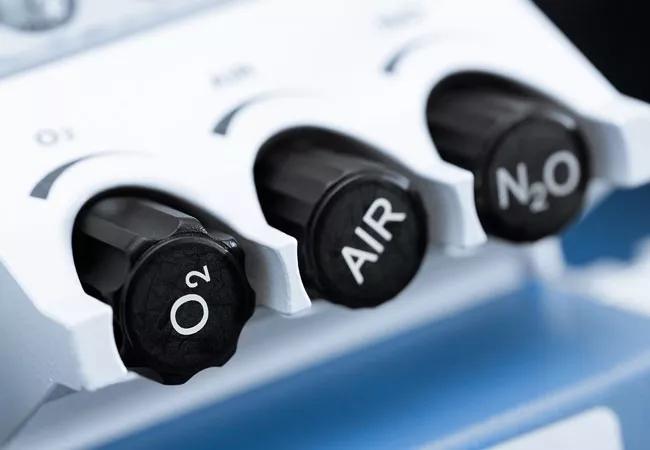While logistical challenges remain, exasperated patients could have a new treatment option

Image content: This image is available to view online.
View image online (https://assets.clevelandclinic.org/transform/5400e80d-f18a-42d1-b0dd-ec85f1725531/20-PAI-1904810-CQD-Nitrous-oxide-for-CRPS_CQD_650x450_1227177888_jpg)
Nitrous oxide
Nitrous oxide has long been used in clinical anesthesia by anesthesiologists, dentists and other practitioners. Now a new study at Cleveland Clinic will investigate whether “laughing gas” can also help with pain management for patients with complex regional pain syndrome (CRPS).
Advertisement
Cleveland Clinic is a non-profit academic medical center. Advertising on our site helps support our mission. We do not endorse non-Cleveland Clinic products or services. Policy
CRPS is a condition that develops as a result of inflammation at the site of a localized injury. Over time, inflammation in the nervous system causes extreme pain and sensitivity, to the point where even touching or blowing air on the affected area can be intolerable. The condition can be devastating for an individual’s quality of life, making it difficult to dress, sleep and engage in other daily activities, says Jijun Xu, MD, PhD, a pain specialist at Cleveland Clinic.
The majority of patients eventually get their pain under control with existing treatment options, including physical therapy, medication, nerve blocks and spinal cord stimulation. “But still there’s a small portion of patients who have tried everything, and they just cannot get their pain under control,” Dr. Xu says.
Nitrous oxide works by targeting N-Methyl- d-aspartate (NMDA) receptors in the nervous system — the same receptors that scientists think become over-activated and play a pivotal role in many neuropathic pain conditions, including complex regional pain syndrome. “That’s why we wanted to investigate whether nitrous oxide could relieve pain in patients with CRPS,” he says.
One reason nitrous oxide hasn’t been tried before is because of the logistical challenges involved in using it. “It’s not routinely used in the pain clinic because we need a special tank and delivery system, and there are a lot of regulations involved,” Dr. Xu says. While researchers received permission to use nitrous oxide as part of the trial, they are also working with regulatory experts and dental offices to learn how pain clinics could feasibly implement nitrous oxide therapy in the future.
Advertisement
For the study, patients will be randomized into two different groups. One group will receive 50% nitrous oxide and 50% oxygen as a two-hour treatment, every other day, for a total of three treatments. The second group will receive pure oxygen on the same treatment schedule. To mimic the sedating effects of nitrous oxide, all patients will receive an active control of midazolam prior to treatment. The patients’ vital signs will be closely monitored during treatment to ensure they are stable.
After the treatments, researchers will follow up with patients after seven days and again after 30 days to evaluate pain relief and functional improvement.
Researchers are recruiting 44 patients who have had CRPS for at least six months for the study. Physicians can refer patients to Dr. Xu’s office if they are interested in participating.
Advertisement
Advertisement
Researchers seek solutions to siloed care, missed diagnoses and limited access to trauma-informed therapies
Study participants also reported better sleep quality and reduced use of pain medications
Two-hour training helps patients expand skills that return a sense of control
Program enhances cooperation between traditional and non-pharmacologic care
National Institutes of Health grant supports Cleveland Clinic study of first mechanism-guided therapy for CRPS
Pain specialists can play a role in identifying surgical candidates
Individual needs should be matched to technological features
New technologies and tools offer hope for fuller understanding